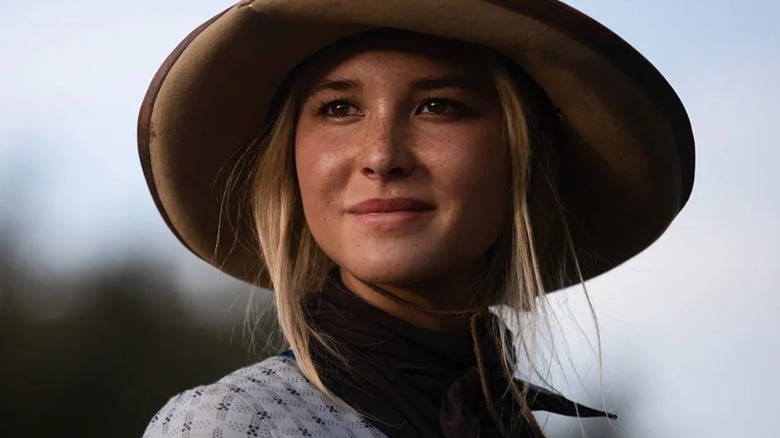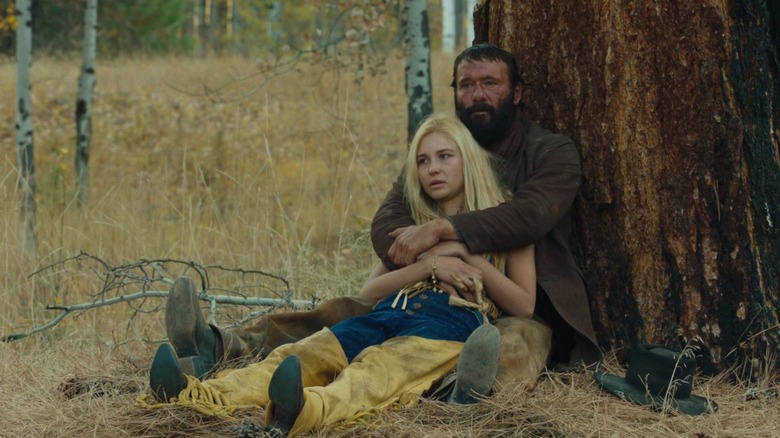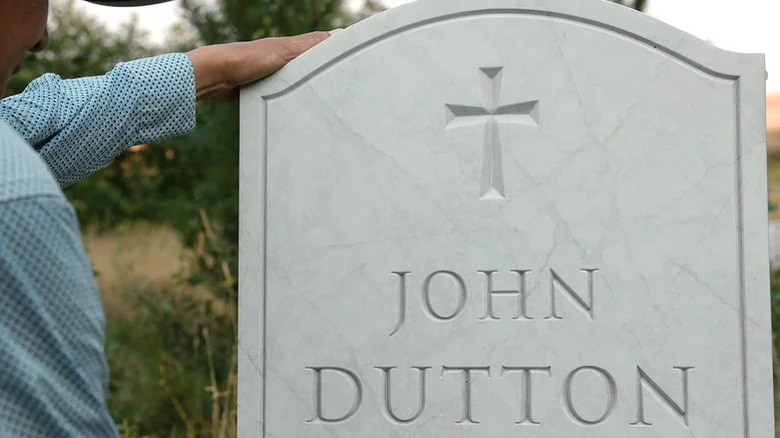Yellowstone: Elsa Dutton's 1883 Death Explained
For longtime "Yellowstone" fans, the hit 2021 prequel series "1883" was a breath of fresh Western air for the larger Dutton saga. Considered by creator Taylor Sheridan to essentially be a 10-hour movie, "1883" explores the lives of the first Duttons to settle in what is now Paradise Valley, Montana. After James (Tim McGraw) and Margaret Dutton (Faith Hill) join a wagon train bound for Oregon, we knew they wouldn't quite make it there. In the penultimate episode, "Racing Clouds," the settlers are attacked by a band of Lakota warriors, who kill most of the travelers and mortally wound others, including the free-spirited Dutton daughter Elsa (Isabel May). Believing Elsa is going to die, the Duttons decide to pitch their tents in Montana instead.
Perhaps the most important thing about "1883" is Elsa's journey in becoming a woman. As she explores the fullness that life has to offer, she both finds and loses love, fights for those she cares for, and even marries a Comanche warrior named Sam (Martin Sensmeier). But instead of following her new husband into his war, she honors the promise made to her parents by seeing their journey through, not knowing it would end with her demise. In the finale, "This Is Not Your Heaven," Elsa succumbs to her wounds while resting in her father's arms. Yet, this is not the end for Elsa: The ending of "1883" concludes with an afterlife reunion between Elsa and Sam, who is likewise revealed to have fallen in battle. Elsa's spirit continues to oversee the land her family settled, but that's not all her death meant for the franchise.
Elsa's death sealed the Dutton family's fate
While Elsa's death is meant to paint a harrowing picture of the Oregon Trail and show how commonplace premature deaths were in this time, that's not all it accomplishes. Sure, the "Yellowstone" prequel ends on some pretty heartbreaking notes, but "1883" had to end the way it did. Had Elsa not died in Paradise Valley, the Duttons would have never settled in Montana. But more than that, a prophetic promise would have never been made by James Dutton with the Crow elder Spotted Eagle (Graham Greene), one that would inform the direction of the rest of the Yellowstone Universe. In the "1883" finale, Spotted Eagle allows James and his family to settle the land, as the Dutton patriarch refuses to bury Elsa and then leave her. However, he notes that in seven generations, his people would rise up and take back the land from them, an agreement James accepts.
In this way, the events of "1883" are paramount to understanding the controversial ending of "Yellowstone." After John Dutton's (Kevin Costner) death, his children, Kayce (Luke Grimes) and Beth (Kelly Reilly), discover that the only way to save their ancestral land from being turned into an airport is to preserve it. Thus, it is sold to the Broken Rock Indian Reservation after Kayce makes a deal with Chief Thomas Rainwater (Gil Birmingham), an event long-foretold by the Crow people. While "Yellowstone's" finale left us with several loose ends, this was one thing that "Life Is a Promise" did impressively well, bringing the Dutton saga full circle — and it would have been impossible without Elsa's death.
Elsa Dutton became the narrator of the Yellowstone saga
Even in the afterlife, Elsa Dutton has continued to watch out for her family. Though she had no children of her own, she had two younger brothers (one who had yet to be born when she died), and she oversaw their stories to their natural conclusion in "1923." Isabel May returned as Elsa in this second "Yellowstone" prequel, taking place decades after her death, to narrate the Prohibition-era struggles of her family. She chronicles her brothers' respective deaths, and even offers some insight from the great beyond concerning their motivations in preserving the family legacy.
Although Elsa does not narrate the entirety of "Yellowstone" (which makes sense considering "1883" aired in 2021 and "Yellowstone" began in 2018), she does narrate part of the series finale, "Life Is a Promise." There, she brings the main narrative full circle. "My father was told they would come for this land, and he promised to return it," Elsa explains as the camera pans across the Dutton gravesite, which now includes her great-great nephew, John Dutton III. "Nowhere was that promise written. It faded with my father's death but somehow lived in the spirit of this place." Without understanding Elsa's tragic end, the ending of "Yellowstone" doesn't make a lick of sense, but with this proper context, we can see that Taylor Sheridan had a plan from the very beginning.


